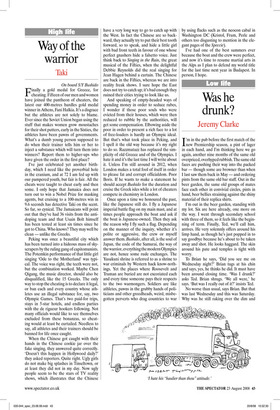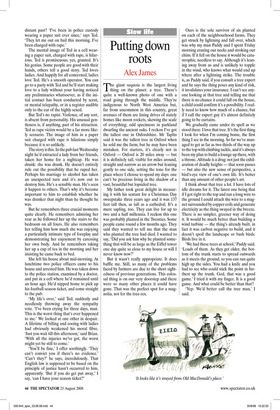Was he drunk?
Jeremy Clarke
I’m in the pub before the first match of the new Premiership season, a pint of lager in each hand, and I’m thinking here we go again, another nine months of the same old overpriced, overhyped rubbish. The same old faces are pushing their way into the packed bar — though some are browner than when I last saw them back in May — and ordering pints from the same old bar staff. Out in the beer garden, the same old groups of mates face each other in convivial circles, pints in hand, beer bellies straining against the shiny material of their replica shirts.
I’m out in the beer garden, standing with my lot. Six are here already, one more on the way. I went through secondary school with three of them, so it feels like the beginning of term. Finally, Ted, we’ll call him, arrives. He very solemnly offers around his limp hand, as though he’s just popped in to say goodbye because he’s about to be taken away and shot. He looks haggard. The skin around his pate and temples is tight with worry.
To Brian he says, ‘Did you see me on Wednesday night?’ Brian tugs at his chin and says, yes, he thinks he did. It must have been around closing time. ‘Was I drunk?’ asks Ted. Brian shrugs. ‘We all were,’ he says. ‘But was I really out of it?’ insists Ted.
No worse than usual, says Brian. But that was last Wednesday and this was Saturday. Why was he still raking over the dim and distant past? ‘I’ve been in police custody wearing a paper suit ever since,’ says Ted. ‘They let me out on bail this morning. I’ve been charged with rape.’ The mental image of Ted in a cell wearing a paper suit, charged with rape, is hilarious. Ted is promiscuous, yes, granted. It’s his genius. Some people are good with their hands, others tell a good story. Ted loves ladies. And happily for all concerned, ladies love Ted. He’s a smooth operator. You can go to a party with Ted and he’ll start making love to a lady without your having noticed any preliminaries whatsoever, as if the initial contact has been conducted by scent, or mental telepathy, or in a register audible only to the ear of the highly sexed.
But Ted’s no rapist. Violence, of any sort, is absent from personality. His unusual gentleness is, if anything, part of his attraction. Ted as rape victim would be a far more likely scenario. The image of him in a paper suit charged with rape is hilarious simply because it is so unlikely.
The story is this. In the pub last Wednesday night he’d extracted a lady from her friends, taken her home for a nightcap. He was drunk: she was drunk. He doesn’t entirely rule out the possibility that he raped her. Perhaps his marriage to alcohol has taken an unexpected turn and it’s now out to destroy him. He’s a sensible man. He’s seen it happen to others. That’s why it’s become important to him to establish whether he was drunker that night than he thought he was.
But he remembers three crucial moments quite clearly. He remembers admiring her rear as he followed her up the stairs to the bedroom on all fours. He also remembers her telling him how much she was enjoying a particularly intimate type of foreplay and demonstrating her enjoyment by caressing her own body. And he remembers taking her up a cup of tea in the morning and her insisting he came back to bed.
She left his house about mid-morning. At lunchtime two police officers came to his house and arrested him. He was taken down to the police station, examined by a doctor, and put in a cell where he’d remained until an hour ago. He’d nipped home to pick up his football season ticket, and come straight to the pub.
‘My life’s over,’ said Ted, suddenly and needlessly throwing away the sympathy vote. ‘I’ve been crying for three days, man. This is the worst thing that’s ever happened to me.’ We looked at one other in despair. A lifetime of billing and cooing with ladies had obviously weakened his moral fibre. ‘Just you wait till this afternoon,’ said Brian. ‘With all the injuries we’ve got, the worst might yet be still to come.’ ‘You’ll be fine,’ I offer soothingly. ‘They can’t convict you if there’s no evidence.’ ‘Can’t they?’ he says, incredulously. That English law is supposed to be based on the principle of justice hasn’t occurred to him, apparently. ‘But if you do get put away,’ I say, ‘can I have your season ticket?’



























































 Previous page
Previous page